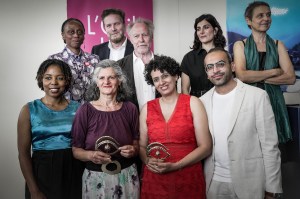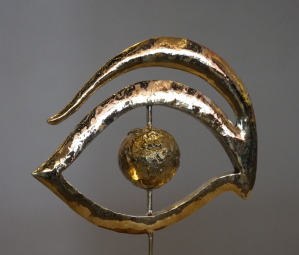For the second year in a row, the L’Oeil d’or prize – the top award for documentary at the Cannes Film Festival – is being shared by two films.
The award announced on the Croisette today went to Ernest Cole: Lost and Found, directed by Oscar-nominated filmmaker Raoul Peck, and The Brink of Dreams, directed by Ayman El Amir and Nada Riyadh.
Peck’s film centers on the titular South African photographer who documented life under apartheid for his country’s oppressed Black population. Actor LaKeith Stanfield voices writings from the late artist in the film. Ernest Cole: Lost and Found premiered in the Special Screenings section of Cannes.
Director Raoul Peck at the Deadline Studio during the 77th Cannes Film Festival presented by NEOM on May 22, 2024.
Michael Buckner/Deadline via Getty Images
The L’Oeil d’or jury – comprised of president Nicolas Philibert, as well as Dyana Gaye, Elise Jalladeau, Francis Legault and Mina Kavani – wrote, “A film that follows the journey of a young South African photographer during the apartheid era. In 1967, at the age of 27, Ernest Cole published a book on the horrors of his country’s regime, the publication of which forced him into exile in the United States and Europe, never to return to his native country. Based on a few testimonies, but even more on the artist’s own words and the extraordinary photographic work recently rediscovered in a Swedish bank, the director tells the story of the wanderings of this fragile, rebellious artist, the loneliness and despair that slowly consumed him to the point where he gradually gave up photography. This tragic destiny, using Ernest Cole’s own words and pictures, deeply moved us.”

The 2024 L’Oeil d’or jury and prize winners.
Courtesy of Benjamin Geminel/HansLucas
The Brink of Dreams (Les Filles du Nil), a film set in the directors’ native Egypt, premiered in the Critics Week sidebar to Cannes. The jury wrote, “The second takes us to a Coptic village in southern Egypt, in the footsteps of a small group of girls who rebel by forming a street theater troupe. Dreaming of becoming actresses, dancers or singers, they try to find their place, defying their families and the patriarchal traditions of their country. A film both simple and luminous, that could almost look like ‘a walk in the park,’ but instead shows us the complexity of their struggle to conquer freedom, and the turbulences generated around them.”
Last year’s L’Oeil d’or also went to two films: Four Daughters, directed by Kaouther Ben Hania, and The Mother of All Lies, directed by Asmae El Moudir. Ben Hania’s film went on to earn an Academy Award nomination for Best Documentary Feature and was Tunisia’s official entry in the Best International Film category. The Mother of All Lies became Morocco’s official entry for Best International Film.

The L’Oeil d’or (Golden Eye) trophy
Matthew Carey
The L’Oeil d’or prize comes with a €5,000 award. Twenty two films vied for the “golden eye” trophy this year; eligible films can premiere in Competition, Un Certain Regard, Out of Competition, Midnight Screenings and Special Screenings, Directors’ Fortnight or Critics’ Week.
The L’Oeil d’or is a relatively new award in the Cannes pantheon, added only in 2015. It was created by SCAM, France’s Société Civile des Auteurs Multimédia. In addition to Four Daughters, previous winners include several other films that went on to earn Oscar nominations: Faces Places, directed by Agnès Varda and JR; For Sama, directed by Waad Al-Kateab and Edward Watts, and All That Breathes, directed by Shaunak Sen.

